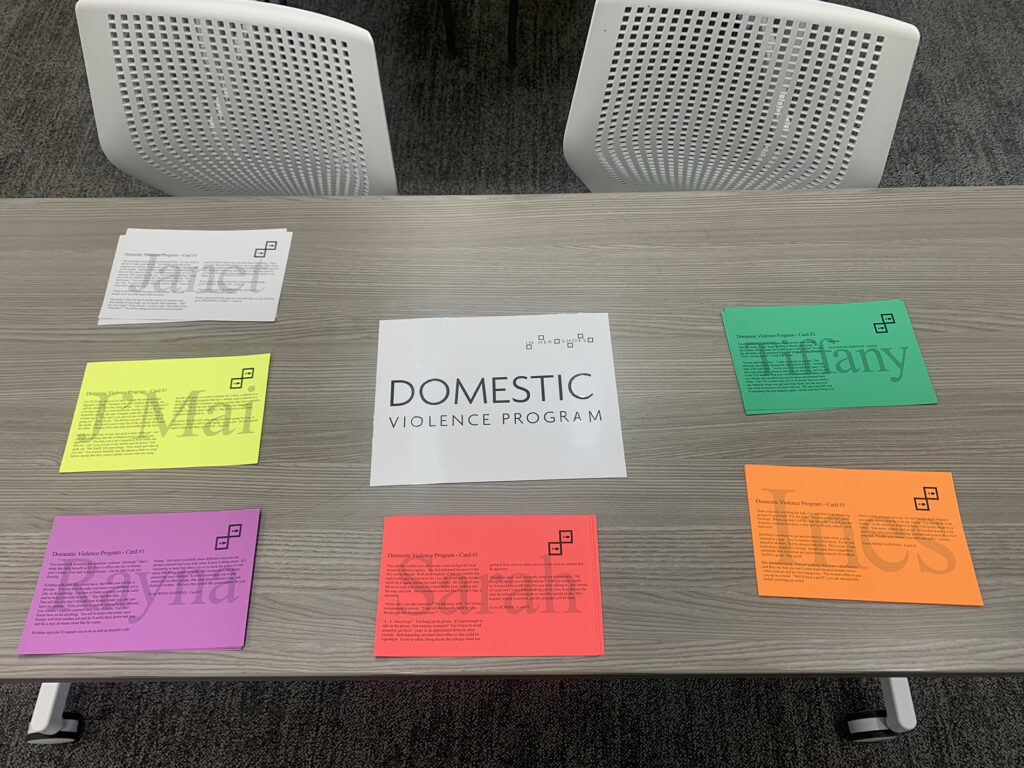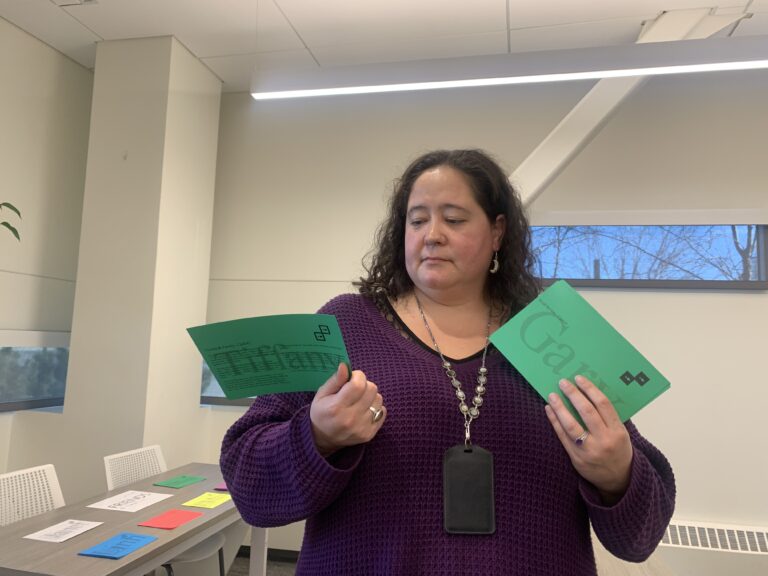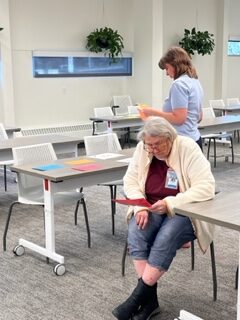ANJC’s interactive training provides staff with the lived experiences of survivors of abuse

No one can find Legal Services.
“It’s over there,” pointed out one participant of the In Her Shoes training hosted by the Alaska Native Justice Center (ANJC) on Monday, October 23.
Larissa Makar, corporate trainer for ANJC partner Cook Inlet Tribal Council (CITC), locates the table that represents Legal Services. She picks up a green card labeled “Tiffany” and reads a brief description. At the end of the description, Larissa is left with a choice. Depending on which option she goes for, Tiffany’s story could take a positive turn—or she could come up against yet another complication as she seeks help with getting out of a domestic violence situation.

Not Just a Game
In Her Shoes feels like a game as participants follow the journey of their characters. But the situations depicted in the activity are serious: They’re based on the real-life scenarios of survivors of domestic abuse.
The activity was developed by the Washington State Coalition Against Domestic Violence as a learning tool meant to simulate the lived experience of individuals involved in abusive relationships. Participants follow directions on a series of cards that confront them with a variety of real-life situations based on actual survivor experiences. For each scenario, they must make decisions about how to proceed.
“This is an interactive, Choose-Your-Own-Adventure domestic violence training,” described Shana Cooper, an advocacy case manager at ANJC. “Domestic violence is a heavy topic, so it can be hard to pull people into a discussion about it. In Her Shoes provides an experiential tool that can generate really thoughtful conversation on the topic.”
Deliberate Difficulties
Playing as “Janet,” ANJC Advocacy Case Manager Olivia Spiezio felt frustrated by their character’s lack of options.

“I like how this activity it set up to be confusing and weird,” they said, adding that, in reality, individuals experiencing domestic violence often run into red tape and baffling bureaucracies as they struggle to find help.
“When I do this activity, I’m reminded that this is the reality of what my clients are going through,” Shana shared.
She pointed out that, in real life, even when individuals experiencing domestic violence have made the often difficult decision to reach out for support, they may face documentation or eligibility requirements, language barriers, or other obstacles that may discourage them from accessing the help they need.
“For the activity, we usually make the table with the Housing cards hard to find—because so often, housing really is a difficult resource to secure,” explained ANJC Advocacy Case Manager Eleanor Pollo, who co-facilitated the training.
Worth the Struggle
Training facilitators might also require activity participants to carry around a sack of potatoes, to drive home the feeling of having to seek services with small children in tow—since oftentimes finding childcare while living in a shelter isn’t possible. Or participants in the activity might discover that the protection order paperwork they need to fill out is in Russian, simulating the confusion some domestic violence victims feel as they navigate the legal system.
After each participant completes their journey, the trainers debrief with the group to discuss what it felt like to work through the experience. Staff in the recent training shared their frustrations at the barriers they came up against and the difficulty they found when trying to make even small steps forward, as well as feelings of helplessness, fear, and surprise at the outcome of some of the decisions they made.
“It’s really worthwhile to go through this exercise in order to experience all the difficult ramifications our people face when they’re trying to leave a violent situation,” said Jessica Burdick, a data specialist for CITC’s Family Services department, who participated in the training.
Preparing Our Direct-Services Staff

In Her Shoes is designed to represent a variety of dynamics, barriers, and identities of survivors and their relationships. A similar activity kit, In Their Shoes, walks participants through dating violence scenarios; CITC’s Strengthening Our Youth (Tribal PREP) program, which provides healthy relationship education to young people, has presented this version of the activity as part of its curriculum.
The edition of In Her Shoes used by ANJC incorporates the additional struggles of domestic violence victims who live below the poverty line. It also provides the perspective of the abusive partner in each situation. You can learn more about the In Her Shoes education tool here.
Shana and Eleanor plan to continue offering trainings for CITC and ANJC staff, with an emphasis on providing direct-service staff with this experience.
“The main thing I hope people gain from In Her Shoes is a better understanding of the barriers [CITC and ANJC program] participants face when trying to leave a domestic violence relationship,” said Shana. “Navigating social service systems is already difficult. Add in an abuser who is committing financial, physical, and/or psychological abuse, and it makes everything even more difficult.”
Individuals experiencing domestic violence can find help through ANJC’s advocacy and support services. Call (907) 793-3550 or use this contact form to reach out today.
Interested in having ANJC staff facilitate an In Her Shoes training for your organization? Reach out to Shana Cooper at shana.cooper@anjc.net.
Learn more about ANJC’s legal services at anjc.org.




